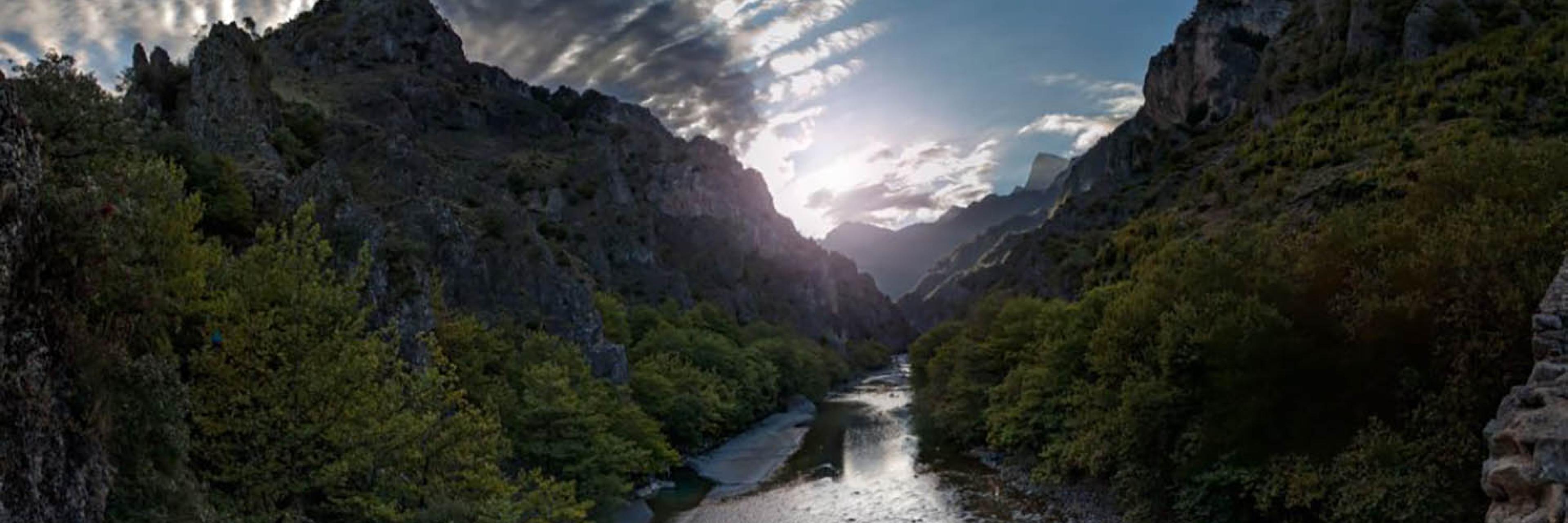
Aoos River
Aoos/Vjosa is a 272 km long transboundary river shared between Greece and Albania, characterised as the longest and the last free-flowing river in Europe. The Aoos rises in Northern Pindos, Greece, and continues as the Vjosa River in Albania, where it reaches the Adriatic Sea. Aoos traverses the Municipality of Konitsa forming a magnificent gorge and flows by the city and the plain of Konitsa, where it meets its two main tributaries, the Voidomatis and Sarantaporos before entering Albania. The Aoos River Basin’s extensive hydrographic network is part of a crucial transboundary ecological corridor for numerous flagship and endangered species. The Aoos River not only supports rich biodiversity but is also central to the livelihoods, traditions, and identities of local communities for centuries.
MedINA has an established presence in the transboundary Aoos/Vjosa River Basin for over a decade, by being part of the international campaign ‘Save the Blue Heart of Europe’ and implementing several conservation projects and initiatives. Through this longstanding engagement MedINA has developed a deep knowledge of the area’s ecosystems, challenges, and specificities, forming collaborations and alliances with local organisations and stakeholders in Greece, as well as in Albania.
Rationale
The ecological integrity of the Aoos River Basin is threatened by unsustainable human activities, including: (a) the development of Small Hydropower Plants (SHPs), (b) river fragmentation from obsolete barriers, (c) solid waste and wastewater pollution, (d) agricultural runoff, (e) invasive and alien species, (f) climate change impacts, and (g) water abstraction (legal and illegal).
MedINA is part of an international alliance working at many levels: (a) research, combining expert and citizen science, (b) awareness raising and community engagement, (c) education, focusing on youth, (d) policy advocacy and lobbying for enhanced institutional protection, aiming to protect the free flow of the Aoos River and its tributaries as a transboundary ecological corridor and a resource for community development. One of our more ambitious goals is to establish the Aoos/Vjosa Transboundary Wild River Park, as a model for conservation at cross-border scale.
Strategy
Our strategy focuses on ecological restoration and multispecies justice, using maps and bios to guide community-driven solutions. Key goals include maintaining free flow for migratory species, reducing pollution sources, and fostering cross-border cooperation. Our revitalisation approach will leverage the knowledge and expertise of local communities to ensure solutions are contextually appropriate and socially equitable. For instance, collaborative workshops with local farmers could explore strategies to minimise agricultural runoff, while cultural events could raise awareness about the river's ecological and cultural value.
Our justice goals could be defined in the context of multispecies justice, a concept that has gained increased momentum in scholarly discourse in recent years. Multispecies justice in this context balances human and non-human needs by recognising their interdependence. While improving water quality benefits local communities, it also restores habitats for endangered species. Participatory methods ensure all stakeholders—humans, animals, and plants—are considered in revitalisation efforts. This justice framework challenges traditional hierarchies, striving to include many different perspectives to conservation planning.
Methods
Our team will employ methods from the humanities and natural sciences to develop a holistic understanding of the Aoos-Konitsa nexus. In this respect, we plan to conduct bibliographic/archival and ethnographic research using community-based recordings and publish the river bio as a digital story map.
Mapping will synthesise ecological, social, and historical data to inform revitalisation efforts. By layering biodiversity, pollution, habitat, and power dynamics, the maps will serve as tools for advocacy and collaborative decision-making, bridging scientific research with local knowledge.